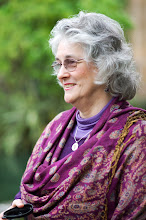I had no idea what to expect. I knew that the woman who organizes it, the Rev. Glenda Hope, is well regarded and considered quite a dynamo. She wanted to assure that this event was an inclusive as possible. One of her colleagues contacted me through a circuitous route, and lo! there I was. I'd have preferred to find a San Francisco Pagan, but didn't know of any who might be good at it and willing to do it on December 21. The actual moment of Solstice being late Thursday afternoon, the longest night was December 20th this year, Wednesday, so many Pagans had already celebrated.
Religions represented were Islam, Roman Catholic, the SF Zen Center, a Protestant (Presbyterian, I think), Judaism, someone from a group connected with Tom Waddell, perhaps the Gay Olympics, and Pagan. There was a news truck from KTVU there and someone else who was videotaping the ceremony. The Muslim man spoke quietly and didn't seem to know how to use a mike. The Zen folks -- there were several -- spoke and then chanted words that they'd handed out ahead of time. They chanted in a monotone.
Between speakers someone read names of people who'd died in the streets in 2006. After each name was read, one of the Zen folks struck a bowl. Glenda had gotten the names from the SF Coroner's Office. I loved the reading of the names. Everyone loves the reading of names. People of many religions know in their hearts and bodies that speaking aloud the names of the departed reaches us in a different way than just reading them. That's one of the things about Spiral Dance Samhain rituals in recent years that most disappoints me. People complain that the list is too long, the reading takes too long, it's boring. Well, I think it's only boring to those who aren't listening. I know that for those who've lost someone that year hearing that person called to dance with us is an important part of their mourning.
I read a prayer by Starhawk from our book, adapted for this situation.
"For One Who Has Died Violently or in Great Distress"I followed with a simple four-line chant by Anne Hill and Starhawk, a C&W-sounding lament called "When We Are Gone." I explained that because we never knew when we'd encounter death, it was good to have something to meet death with, anyone's death, and that this simple chant was good for that. Before we began, I suggested that people might want to take the hand to the person next to them, if they felt comfortable doing so. I asked them to look around at the faces of those around them. I suggested that if that didn't feel right, they might want to close their eyes and see the faces of those they'd lost. I asked those who liked to sing to add harmonies when they wanted, and said we'd break into a four-part round -- we stood in a rather clumpy circle, about three or four deep -- when we got going and everyone knew it well enough.
Mother of healing,
Help us to believe in the
Place where wounds can heal.
Mother of weaving,
Show us that what has been torn
Can there be mended.
This worst has happened.
How can we believe again
In hope, love, kindness?
Boatman, Ferryman,
They have had rough crossings.
Carry them gently.
Comfort them, Mother,
In your warm arms of
Night; rock them to sleep.
And by our rage,
Mother of Justice,
May justice be done.
I taught the chant by speaking the words once. Then I sang one line at a time and asked those assembled to repeat it; then I did the whole chant again two lines at a time, with repeat. Then I sang all four lines and asked them to join it.
Well, I'm telling you, getting them to sing, even such a simple little chant, was like the proverbial pulling of teeth! The Zen folks, bless them, did sing. I looked all around the circle several times as we sang, seeking connection with my eyes to others. I'd guess that maybe 20% of those there actually sang. Needless to say, we never broke into a round. I brought it to a gentle end by drawing out the last word.
The ceremony didn't last long but it was satisfying. It was over in time for me to get to Berkeley to celebrate the Solstice with Coven Trismegiston.

1 comment:
I think the reading of names is really powerful. I listened to the list of those who died in the World Trade Center the year after it happened, and the tears were streaming down my face before they got to the end of the A's. I didn't personally know anyone on that list, but it was still very moving.
Another way I have seen it done is for each person in the circle to speak briefly about (or just name) their loved one who has died - though if you're reading names of friends or relations of people who are not there, maybe the list approach is best.
The Pagan Book of Living and Dying is a wonderful resource.
Post a Comment